 loading
loading
featuresThe strangerTwo Tony awards and a dazzling Broadway career haven’t erased Michael Cerveris’s lifelong feeling of being an outsider. But it might just be what makes him a great actor. Mark Blankenship ’05MFA, a theater critic and reporter, is the editor-in-chief of TDF Stages and producer of the film series Meet the Theatre. 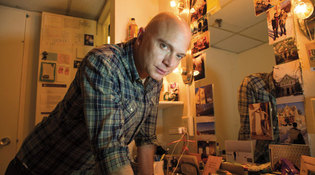 Mark OstowView full imageIt’s hard to perceive Michael Cerveris ’83 as an outsider. After all, he recently won the 2015 Tony Award for Best Lead Actor in a Musical for Fun Home, one of those rare Broadway endeavors that’s both commercially and critically successful enough to burnish the reputation of everyone involved. That’s only the latest achievement in a career that has made him one of the most important performers in contemporary musical theater. Whether he’s bringing palpable humanity to the title role in The Who’s Tommy or delivering revelatory reinterpretations of Sondheim characters, Cerveris is the go-to favorite for what are called “tough” roles—meaning they require an emotional complexity and intellectual fire that you just can’t evoke with jazz hands and a Pepsodent smile. Toss in his bustling TV career—which has included recurring roles on The Good Wife, Fringe, and Treme, among others—and you’d be forgiven for thinking Michael Cerveris lives with the in-crowd. Yet as he sits on a small sofa in his dressing room at Circle in the Square Theatre, where Fun Home began performances last spring, he says that rave reviews, sell-out houses, and fancy trophies are, at best, a temporary distraction from his chronic sense of not belonging anywhere. “That’s almost, in a nutshell, how I’ve felt my whole life and career,” he says. “Even in the theater world, I’m amused and sometimes baffled that I’ve come to be known as this musical theater performer, since I never intended to be in musicals.” This doesn’t play as false modesty. Relaxed and thoughtful in jeans and a faded t-shirt, Cerveris, 55, seems less like a neurotic artist in need of praise than like the cool guy sitting contemplatively in the back of a college class. When he talks about his otherness, he describes it matter-of-factly, the way he might reference his famously bald head or the stack of vintage LPs he keeps near his pre-show snacks. And in a way, it makes sense that he’d be sanguine about that part of his life. What he calls his “out-of-placeness” has arguably shaped his artistic identity and helped him craft some of the most wrenching and exposed theatrical performances of the last 25 years. To some degree, we may know him only because he’s never felt known. 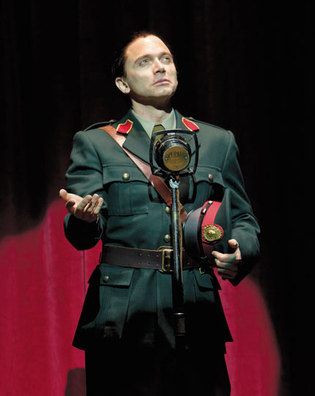 Richard TermineView full image Carol RoseggView full image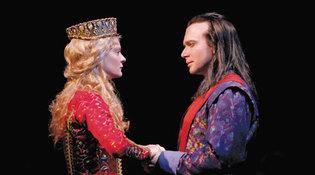 Paul KolnikView full image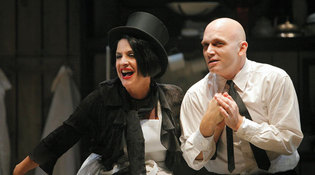 Paul KolnikMichael Cerveris ’83 has made a name for himself playing emotionally complex roles (top to bottom): Juan Perón in Evita; Hedwig in Hedwig and the Angry Inch; Posthumus in Cymbeline; and the title character in Sweeney Todd. View full imageCerveris pinpoints the beginning of his in-between life to the late 1970s. After his family had been moving around the country for years, following his father’s work as a professor of music, he found himself reasonably settled in Huntington, West Virginia, where his dad was on the faculty at Marshall University. During his sophomore year of high school, when a representative from Phillips Exeter Academy in New Hampshire gave a presentation for honors students, he didn’t divine an impending upheaval. He stayed through the talk, but only because it let him skip a class he didn’t like. “I then got dragged to the vice principal’s office by the teacher, who rightly assumed [my friends and I] were just skipping,” he says. “And of course I had to say, ‘No! We’re very interested in the school, and please send materials to my home!’” When the materials came, Cerveris saw that two years at Exeter could potentially push him further than a life in West Virginia. “I sat at my kitchen table with my family and thought, ‘I’m really happy with my life as it is, and I have no eagerness to get out of here. And I think I could be happy just living here. And I somehow know that if I go away, I won’t ever be content living in this small town.’ But soon after that came the realization that I wasn’t supposed to be content with this. I wasn’t supposed to stay here. I was 15, 16, but it was really clear to me.” And so began the not-quite-belonging. As a southern transplant to a tony northern boarding school filled with students who had been together for years, Cerveris felt isolated almost immediately. After about a month, he auditioned for a school production of The Comedy of Errors. He didn’t get a major role—no one has ever made a name for himself playing Angelo, the goldsmith—but still, he learned that the theater could offer a fixed point in an otherwise unstable environment. “I knew the rules of this world,” he says. “I knew this darkened theater with a little light on the stage was familiar. And I suppose that was the one consistent home I had through school and then in all these places and all these cities I went later—onstage, surrounded by the dark, with a little light on my area. It sounds contrived, but it’s actually the truth.” The stage kept calling when he was an undergraduate at Yale, majoring in the humanities with an emphasis in theater studies. “I wanted to do Shakespeare, so I thought, ‘I should probably develop my vocal mechanism, so I’ll just take voice lessons.’ I studied with Blake Stern, who taught at the music school but also taught undergrads. He said, ‘I know you’re not gonna be an opera singer, but I’m gonna train you as though you were going to be.’” At the time, Cerveris was determined to be a “straight dramatic actor.” Even when he got an early TV gig on the 1980s musical series Fame—starring as a British exchange student with a very New Wave haircut—he wasn’t anticipating the arc of his career. The signs were harder to ignore by 1993, when he made his Broadway debut in Tommy, the stage adaptation of The Who’s concept album. He earned his first Tony nomination and toured with the show to Europe, ultimately playing 1,403 performances. (He has that exact number committed to memory.) Around this time, Cerveris began dabbling in rock music, and he followed up his performance in the 1997 musical Titanic by playing in the backup band for punk legend Bob Mould. Today he has a sideline in a band of his own, a country-rock outfit called Loose Cattle. “I’ve been straddling artistic worlds, and I’ve always been slightly afraid that I was going to be found out at any moment as not really belonging anywhere.” As much as any place he’s lived, New Orleans is the city Cerveris feels tied to. He was introduced to the city when he filmed a vampire movie there in 2007. “I got deeply involved in the community that was in the early stages of recovering from Katrina and the flood after, and I made a lot of really great friends and started going as much as I could,” he recalls. “That reawakened a whole new sense of myself being raised in the south.” Of course, even though he owns a home there now, he’ll never feel he’s “from” New Orleans. “I’m very conscious of not having grown up there and not having been raised there,” he says. “I’m conscious that I’m from someplace else originally. The best metaphor that I came across was when someone said, ‘You know, even the ground you stand on in New Orleans came from upriver.’ So there’s nothing that’s indigenous there, really. That was sort of comforting. And what’s that other saying? ‘I wasn’t born here, but I got here as fast as I could.’” Cerveris’s notable characters include the spiritually tormented John Wilkes Booth in Stephen Sondheim’s Assassins—which earned him his first Tony Award in 2004—and Hedwig, the East German trans punk goddess in Hedwig and the Angry Inch. (Cerveris forever cemented his indie theater cred with Hedwig, since he took over the role in 1998 from its legendary creator, John Cameron Mitchell. In some circles, that’s like being the handpicked successor to the Pope.) It’s actually hard to imagine Cerveris ever playing a well-adjusted guy. Even on Fame he was a foreign student learning the ropes, and on Fringe he was an otherworldly being who was eventually forced to become human. In Sweeney Todd he was the misanthropic title murderer, in LoveMusik the heartsick Kurt Weill, and in Evita a dyspeptic Juan Perón. A pattern emerges. Cerveris’s inhabiting this type of character is what tends to excite people about his work. “I can think of few stage actors who are both so consistently who they are and so capable of surprising me,” says Rob Weinert-Kendt, a New York–based theater critic and the editor of American Theatre magazine. “He has a rich, orotund, plummy speaking voice and the diction of a voiceover narrator. He has a round, cherubic face that’s sensitive and expressive yet somehow also guarded, masklike, hurt. Which is maybe how he can seem both soft and edgy, both grand and small.” Those qualities may also explain why he rarely gets cast in bright and shiny productions. “I sometimes say, ‘Why can’t I be the fun guy? I can be funny!’” Cerveris says. “But maybe something about the reason I get those [serious] parts is because I give the impression, the accurate impression, of being somebody who understands what that chronic outsider feeling is. The specifics of it may change, but the essential ‘outsiderness’ of it, I guess, is something I bring with me into the room. But they’re generally fascinating, complex characters to play. I enjoy getting inside them and trying to figure it all out.” 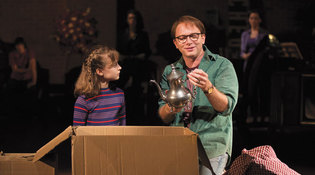 Joan MarcusView full image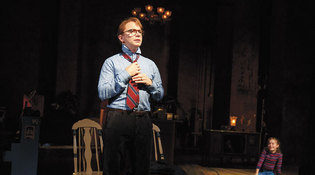 Joan MarcusCerveris won a Tony Award for his leading role in the musical Fun Home (above, with Sydney Lucas as his daughter), an adaptation of Alison Bechdel’s graphic novel. Cerveris plays Bechdel’s father Bruce, a closeted gay English teacher and funeral home director. View full imageFrom that perspective, Bruce Bechdel, Cerveris’s role in Fun Home, may be the most perfect fit he’s ever had. The show is based on the powerful autobiographical graphic novel of the same title by cartoonist and MacArthur award winner Alison Bechdel. It tracks her dawning awareness of her queer sexuality, from the time she was a little girl in the 1970s, through her awkward college years, to the present day. In the musical, three different actresses play Alison at these ages—even as the adult Alison is constantly onstage, narrating and watching. But Fun Home is also about Alison’s relationship with Bruce, her father. A funeral home director, compulsive interior decorator, and English teacher, Bruce too was gay. Unlike his daughter, however, he could never come out, or at least not fully. In the first scene of the play, we learn that his early death was probably a suicide: he was apparently unable to continue his half-shadowed life. Cerveris enacts the Bruce of Alison’s memories, obsessively perfectionist and prone to sudden rage. One crushing scene takes place when the child Alison happily shows her dad a drawing she’s made of their town. Cerveris makes it clear that Bruce is proud of his daughter—taking a beat to gaze at her with the wonder of a parent who’s discovering he has a gifted child. But then we see his body go rigid with the fear that dominates so much of his movement around his family. What if the teacher thinks Alison’s drawing is stupid? What if the teacher thinks Bruce is stupid for letting her draw that way? Face flickering with anxiety, he grabs the picture from Alison and starts “correcting” it, sitting next to her on the floor as though this were a bonding moment. Fixated on the drawing, he loses track of his daughter altogether, and when his wife chides him for it, he lashes out with a nastiness that suggests he’s both furious at being interrupted and embarrassed to be silencing his child. This exchange takes two minutes, and onstage nobody comments on how it wounds everyone. But there’s no need to draw it out or spell it out. We can feel what’s slicing through every person in the room. There’s more to Bruce than viciousness, however. Near the end of the show, he takes the stage by himself for a song called “Edges of the World.” In some five minutes, he lays bare the impossibility of his own life, providing an emotional context for the regret and shame that have chased him for as long as he can remember. It turns him into a whole and knowable person. But it’s the cumulative impact of Cerveris’s performance that allows us to empathize with Bruce during these final revelations. Throughout the show, the actor lets us see the panic and tenderness that keep mitigating the man’s cruelty, so that we never quite dismiss him as a monster. And when the solo finally arrives, Cerveris delivers it with an unexpected aura of exhaustion. Yes, he hits the big, powerful notes, but there’s no catharsis. Instead, we sense that this reckoning is forcing Bruce to realize that he has lost the fight—that his demons are stronger than he will ever be. It’s a devastating preamble to his suicide and a wrenching portrayal of the damage done by living an artificial life. After the song ends, two bright lights, like headlights, suddenly switch on in the dark theater, shining straight at Cerveris. A loud horn sounds. It’s an oncoming truck, and Bruce Bechdel is facing it, waiting for the collision. Then the stage goes dark. “Edges of the World” also clarifies that Cerveris has both the craft and the understanding to make Bruce a human being. Beth Malone, who plays the adult version of Alison, is on stage during the song, so she’s seen him perform it hundreds of times. “There’s a moment where we look at each other, and we always connect in a way that seems to say, ‘Oh crap, here we go,’” she says. “And then we go over the edge together. I’ve never really experienced anything like it. We are both sort of comfortable with each other’s pain as it relates to the material in the show. We both went to Beech Creek”—the town in Pennsylvania where the Bechdels lived—“together, and we were both undone as we stood on the shoulder of Route 150, looking at the spot where Bruce Bechdel was killed. We hold that visit in each other’s gazes each night.” Asked about his own connection to the role, Cerveris says, “So few of the particulars of his life are familiar from my own life, but I have feelings that are synonymous enough that I can relate. I grew up in the middle of an area in West Virginia that wasn’t exactly given to nurturing creativity. I went to Beech Creek, and I was amazed when I thought about these people with these minds and these talents in this town where there’s nothing. Just nothing. There are just farms and hills and mountains in the distance. And I really understand what that feels like, to be that out of sync with your environment.” For all the affinity he might feel, Cerveris draws a definite line between his characters and himself. That distance—and there it is again, the sense of alienation—is part of the reason he likes acting. “I have the protective armor of the character that somebody else wrote, but the attempt and the desire, always, is to infuse it with a true personal connection,” he says. “So the result is a very revealing portrait of yourself, disguised as somebody else—so it’s safe to do. There isn’t really a simple explanation for the feeling of liberation and personal attachment I felt or feel portraying these characters. Just a deep feeling that something in the ways they struggle to understand themselves and suffer by their attempts to live a ‘normal’ life in worlds where they don’t seem to wholly belong feels knowable to me.” He continues, “Hedwig is a great example. I used to have people come and say, ‘I just can’t even find you anywhere in that,’ and yet I was feeling like this is the most exposed and honest thing I’ve ever done. It was empowering to embrace the idea of owning your freakishness, to wear your difference like armor and let your vulnerability be your strength. With Bruce, it’s perhaps the struggle to be a good man when you know you are flawed. And how, until you accept yourself with your failings, you can do such unintended damage to yourself and those around you.” He pauses, thinking. Then: “I guess that’s the appeal of performing in general. It’s being able to express very private, personal things that you can disavow as soon as the lights go up at the end. You have plausible deniability from the time the applause starts.”
The comment period has expired.
|
|